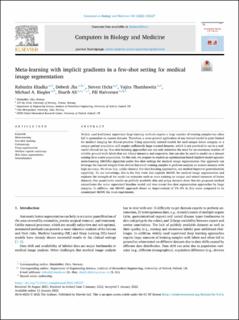| dc.contributor.author | Khadka, Rabindra | |
| dc.contributor.author | Jha, Debesh | |
| dc.contributor.author | Riegler, Michael A. | |
| dc.contributor.author | Hicks, Steven | |
| dc.contributor.author | Thambawita, Vajira | |
| dc.contributor.author | Ali, Sharib | |
| dc.contributor.author | Halvorsen, Pål | |
| dc.date.accessioned | 2022-03-09T14:18:45Z | |
| dc.date.available | 2022-03-09T14:18:45Z | |
| dc.date.created | 2022-01-28T15:09:25Z | |
| dc.date.issued | 2022-02-03 | |
| dc.identifier.issn | 0010-4825 | |
| dc.identifier.issn | 1879-0534 | |
| dc.identifier.uri | https://hdl.handle.net/11250/2984082 | |
| dc.description.abstract | Widely used traditional supervised deep learning methods require a large number of training samples but often fail to generalize on unseen datasets. Therefore, a more general application of any trained model is quite limited for medical imaging for clinical practice. Using separately trained models for each unique lesion category or a unique patient population will require sufficiently large curated datasets, which is not practical to use in a real-world clinical set-up. Few-shot learning approaches can not only minimize the need for an enormous number of reliable ground truth labels that are labour-intensive and expensive, but can also be used to model on a dataset coming from a new population. To this end, we propose to exploit an optimization-based implicit model agnostic meta-learning (iMAML) algorithm under few-shot settings for medical image segmentation. Our approach can leverage the learned weights from diverse but small training samples to perform analysis on unseen datasets with high accuracy. We show that, unlike classical few-shot learning approaches, our method improves generalization capability. To our knowledge, this is the first work that exploits iMAML for medical image segmentation and explores the strength of the model on scenarios such as meta-training on unique and mixed instances of lesion datasets. Our quantitative results on publicly available skin and polyp datasets show that the proposed method outperforms the naive supervised baseline model and two recent few-shot segmentation approaches by large margins. In addition, our iMAML approach shows an improvement of 2%–4% in dice score compared to its counterpart MAML for most experiments. | en_US |
| dc.description.sponsorship | D. Jha is funded by the PRIVATON project (#263 248) which is funded by Research Council of Norway (RCN). S. Ali is supported by the National Institute for Health Research (NIHR) Oxford Biomedical Research Centre (BRC). Our experiments were performed on the Experimental Infrastructure for Exploration of Exascale Computing (eX3) system, which is financially supported by RCN under contract 270 053. | en_US |
| dc.language.iso | eng | en_US |
| dc.publisher | Elsevier | en_US |
| dc.relation.ispartofseries | Computers in Biology and Medicine;Volume 143, April 2022, 105227 | |
| dc.rights | Navngivelse 4.0 Internasjonal | * |
| dc.rights.uri | http://creativecommons.org/licenses/by/4.0/deed.no | * |
| dc.subject | Meta-learning | en_US |
| dc.subject | Few-shot learning | en_US |
| dc.subject | Colonoscopy | en_US |
| dc.subject | Polyp segmentation | en_US |
| dc.subject | Wireless capsule endoscopy | en_US |
| dc.subject | Skin lesion segmentation | en_US |
| dc.title | Meta-learning with implicit gradients in a few-shot setting for medical image segmentation | en_US |
| dc.type | Peer reviewed | en_US |
| dc.type | Journal article | en_US |
| dc.description.version | publishedVersion | en_US |
| dc.rights.holder | © 2022 The Authors | en_US |
| dc.source.articlenumber | 105227 | en_US |
| cristin.ispublished | false | |
| cristin.fulltext | original | |
| cristin.qualitycode | 1 | |
| dc.identifier.doi | https://doi.org/10.1016/j.compbiomed.2022.105227 | |
| dc.identifier.cristin | 1992702 | |
| dc.source.journal | Computers in Biology and Medicine | en_US |
| dc.source.volume | 143 | en_US |
| dc.source.issue | 143 | en_US |
| dc.source.pagenumber | 1-10 | en_US |
| dc.relation.project | Norges forskningsråd: 263248 | en_US |

